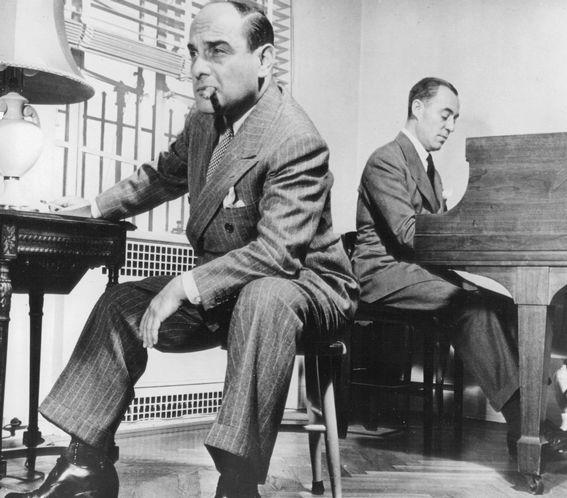Assuming you want to learn more about songwriting, and assuming you agree with me that you can learn a lot by studying the old masters, I can give you a resource that will give you a basic and graduate education.

The Ella Fitzgerald Song Books were records issued from the mid-50s to the mid-60s by VERVE, a Jazz label known for having the top talent in the field.
Verve guru Norman Granz came up with the idea for this series, which basically delineated the Great American Songbook (GAS). Now, the GAS is not a formal list of music, but it is basically a repertoire that is agreed-upon by people as the Standards (with a capital “S”) of popular music prior to the rock and roll era.
What makes a song a standard? And why would you like to write a standard?
The term is given to songs that are so great that they never go out of style and most popular singers like to record their versions. Don’t let the “pre-rock and roll” tag fool you. These songs are still recorded many times a year by big stars. In the past we have seen collections of standards from people like Rod Stewart, Carly Simon, Linda Ronstadt, Harry Nilsson, and the Supremes who were big stars in the 60s and 70s and found new audiences when their own style of music was no longer in great demand.
Recently, Lady Gaga teamed up with 40s and 50s crooner Tony Bennet to record those same standards. Michael Buble has been active for about 15 years keeping the Sinatra torch burning for new audiences. Queen Latifah broke away from her hip-hop base with “The Dana Owens Album” (guess what her real name is?). And Cyndi Lauper had some girl-fun with the standards too.
The benefits to a songwriter are apparent — constant royalty checks from getting your songs recorded over and over. Even if you beat the odds and make the pop charts, your song may only have a shelf-life of a few months. An “evergreen” standard can be your retirement program and support you the rest of your life.
Ella Fitzgerald was the perfect person to present the great songbooks. Her voice was versatile and she could handle anything from “sweet” to “hot.” Even without the songbooks, she would have been considered legendary. We are fortunate she made these albums.
Two things that set Ella’s songbooks apart from the many other collections of GAS:
1.) She usually includes the verse. Terminology has changed in the past century, but basically what we know a song today is usually the refrain (or sometimes called chorus) of the song. Take a well-known song like “My Funny Valentine” and you will discover that there is an introduction to the song you may never have heard before. Ella’s version is one of the best (of course). It was traditional for a song to have a verse. Later, the verse was dropped and a lot of the short-attention-span people would say, “Don’t bore us, skip to the chorus). Trivia: Jerome Kern preferred the term “burthen” — an archaic term. That’s just the kind of guy he was, and you’ll see it written on sheet music.
2.) Norman Granz made sure she had the best arrangers of the day in the studio with her — the people that made the biggest hits with Sinatra, Nat King Cole and Bing Crosby. The arrangements range from large, lush orchestras to swinging big bands to cool and smooth small jazz combos. They frame Ella’s voice perfectly and Ella is a chameleon who can take on any style.
The collection includes eight albums. Most have more than one disc. They all start with “Ella Fitzgerald Sings …” and the titles are —
… the Cole Porter Songbook (1956)
… the Rodgers & Hart Songbook (1956)
… the Duke Ellington Songbook (1957) (Duke Ellington & Billy Strayhorn)
… the Irving Berlin Songbook (1958)
… the George and Ira Gershwin Songbook (1959)
… the Harold Arlen Songbook (1961)
… the Jerome Kern Songbook (1963)
… the Johnny Mercer Songbook (1964)
And there was one later addition that Granz convinced Ella to record for another label (Pablo Records in 1981 that was not “American” — but many of the songs are standards that are included on GAS albums:
… the Antonio Carlos Jobim Songbook (Portuguese title: Ella Abraça Jobim) (1981) Jobim was a Brasilian songwriter and performer who brought his Bossa Nova stylings to the mainstream. He wrote for and even recorded with Sinatra and his songs have been covered by all the stars of the GAS.
Verve reissued the eight albums in 1994 in a boxed set and won the 1995 Grammy for Best Historical Recording.
When I say these recordings are great learning tools, I am not saying that you have to learn to write these types of songs.
What I am saying is that you can learn what can be done … and learn tricks used by the greatest songwriters of the 20th century. Most of the techniques of songwriting — even the songs at the top of the charts today — are old. Maybe more than a century old. They come from roots in other countries as well as the USA.
And of course these are not the only examples that you should pay attention to. There are many great songs that have been written through history.
But if you really love music and you really love songwriting, you won’t view these songs as some drudgery like school homework. You will greedily consume them and keep returning to them whenever you feel the need for inspiration.
But I urge you — pay attention to the music. Pay attention to the lyrics. Learn from these songs.
And like consuming good food, these will nourish your talent and make you into a powerful songwriter.
